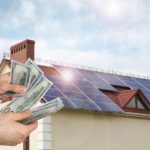The sun is an excellent source of clean energy. It can be used in a way that surpasses traditional energy sources and at a lower cost. But, dependence on the sun to generate power has its limits. Weather conditions are the most important. How does the snow affect solar panels, or what will the cloud affect solar panels? Many potential solar panel buyers are concerned about these questions. It addresses such doubts.
Here are the details about how weather conditions can impact your solar PV cells’ performance.
Cloudy Environment
Because PV cells depend on sunlight for their functioning, panels in cloudy tend to be less productive than those in sunny. The overcast day output of a solar panel depends on the density of cloud cover. Solar panels may be affected by thin clouds or cirrocumulus, for example. On partly cloudy days, the performance of even the most efficient solar panels for the cloudy day can drop by 10% to 25%. Rainy days can be just as detrimental as you might think. It can also negatively impact the output of panels if they become dusty. Rainwater can be used to wash away dirt and save some maintenance costs.
Snowy Environment
A thick layer of snow can affect the energy production of PV cells. However, some sunlight can still pass through the snow. Rooftop installations are often done so that snow falls naturally. Surprisingly, the snow blanket around your home can increase solar energy generation because the radiation reflected by the snow acts like a mirror. This increases the intensity of solar radiation reaching the panels in winter.
Extreme Weather
The weather effect on panels is one of many myths. High temperatures can increase efficiency. Solar panels work better when the temperature is low, even though it sounds strange. The voltage drop in the PV cells reduces the power output. High temperatures can make solar panels less productive. A sunny, calm day is better for optimal solar panel operation.
Windy Environment
Modern panels can withstand winds of up to 90 mph. However, boards that are poorly designed may not withstand such strong winds. The meetings are rarely the problem, even if the system fails. Most problems are caused by issues with the roof or racking system where the panels are installed. Windy conditions can also cause damage to panels from dust and flying debris. Most solar panels can withstand harsh weather conditions, however.
Lightning
Based on the way it strikes the panels, lightning can cause damage to solar panels or inverters. Direct lightning strikes can melt panels. Indirect lightning strikes are more common than direct strikes and can cause voltage surges that damage several components of your system. Companies that offer lightning insurance are available to solar panel users living in areas susceptible to lightning strikes. Genus employs the LA (lightning arrestor) to capture the lightning and protect its solar power station.
Solar panels have become more resilient and efficient with technological advancements. They can be used in all weather conditions. Customers must first understand their local requirements before making an informed decision about which panel to purchase.








